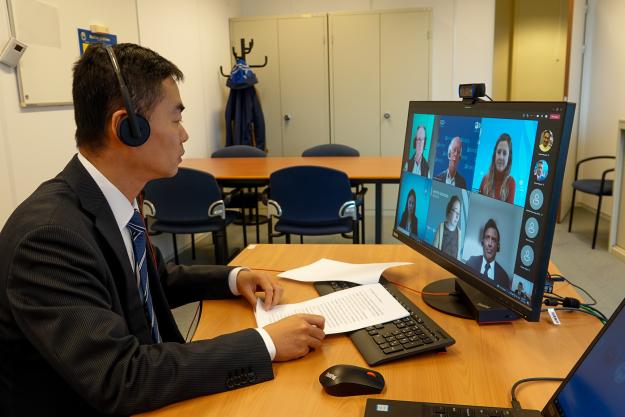
THE HAGUE, Netherlands–17 November 2021–Representatives of international organisations and specialised agencies considered ways of strengthening cooperation and leveraging resources and expertise for the prevention of, preparedness for, and response to industrial chemical accidents. The online meeting was convened today by the Organisation for the Prohibition of Chemical Weapons (OPCW) in the framework of Inter-Agency Coordination Group on Chemical and Industrial Accidents (IACG).
Opening the event, the Head of the OPCW’s International Cooperation Branch stated: “The OPCW remains committed to enhancing inter-agency cooperation in the area of chemical safety and security management with a view to reducing chemical accidents. We continue to deliver capacity building programmes that support process safety and chemical security management to the benefit of all OPCW Member States, despite the challenges imposed by the pandemic. The key approach is to reduce and eliminate risks associated with chemicals and chemical plants in order to prevent accidents and incidents”.
The meeting allowed the participants to exchange information on key programmes, guidance documents, and processes concerning industrial chemical safety among the IACG’s members. Participants also discussed how to avoid potential duplication of work across the agencies and to enhance synergies. Such efforts help international organisations and institutions convey a common message relating to industrial chemical accidents.
The meeting gathered more than 20 professionals from 14 organisations, including: the United Nations Economic Commission for Europe (UNECE), Organisation for Economic Cooperation and Development (OECD), European Commission’s Directorate-General for European Civil Protection and Humanitarian Aid Operations (DG ECHO), Directorate-General for Environment (DG ENV), Directorate-General for International Partnerships (DG INTPA), European Commission Joint Research Centre (EC JRC), International Labour Organization (ILO), United Nations Disaster Risk Reduction (UNDRR), United Nations Institute for Training and Research (UNITAR), United Nations Environment Programme (UNEP), United Nations Environment Programme/Office for the Coordination of Humanitarian Affairs Joint Environment Unit (UNEP/OCHA JEU), United Nations Industrial Development Organization (UNIDO), World Health Organization (WHO), and European Process Safety Centre (EPSC).

Background
The meeting was held as part of OPCW’s efforts towards full implementation of Article XI of the Chemical Weapons Convention that encourages the economic and technological development of OPCW Member States through free participation in the exchange of chemicals, equipment, and scientific and technical information, in accordance with the provisions of the Convention.
As the implementing body for the Chemical Weapons Convention, the OPCW, with its 193 Member States, oversees the global endeavour to permanently eliminate chemical weapons. Since the Convention’s entry into force in 1997, it is the most successful disarmament treaty eliminating an entire class of weapons of mass destruction.
Over 98% of all declared chemical weapon stockpiles have been destroyed under OPCW verification. For its extensive efforts in eliminating chemical weapons, the OPCW received the 2013 Nobel Peace Prize.
